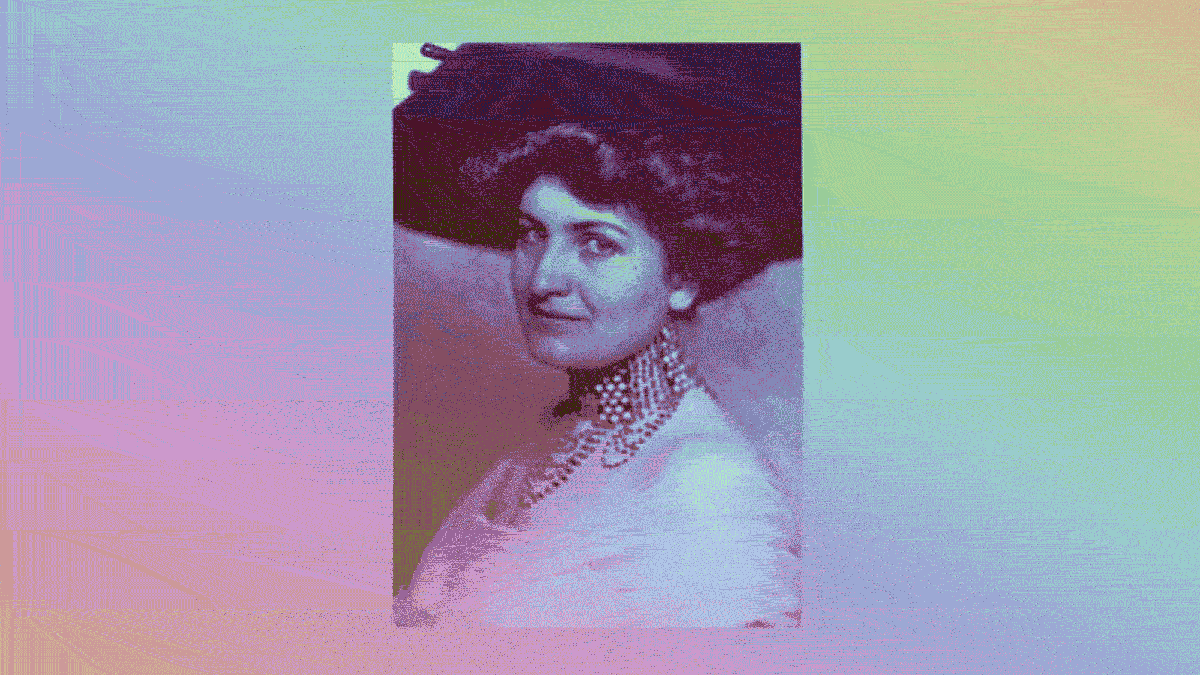Alma Mahler was a witty socialite with an appetite for sex and an eye for talent. By early adulthood, she had become a prolific composer. More than anything, she aspired to be Great, with a capital G. But Alma’s claim to fame, so eloquently outlined in her obituaries, is the long list of geniuses with whom she went to bed. More often than not, this is attributed to a supernatural power to which all men fell prey. Tom Lehrer’s “comedic” song hammers home the point:
You’d never be free of her spell…
Which of your magical wands got you Gustav and Walter and Franz?…
And he too was caught in her net…
She’s been called “the siren with the blue eyes,” “a very intriguing monster,” and a “man-hungry beauty.” Norman Lebrecht, author of Why Mahler? How One Man and Ten Symphonies Changed Our World, plays into the trope: “Her fatal attraction is a physical magnetism… Men fall at her feet. The last of her husbands describes her… as ‘one of the great sorceresses.’ It is this magic that kindles Mahler’s love and desire.”
Time and again, biographers fault Alma for sleeping with too many men, for not grieving enough and for performing motherhood incorrectly. Just like women accused of witchcraft in the 16th century witches, any and every line of argument has been used to strip Alma of her humanity and make her into a token villain.
Her first “victim” is said to be artist Gustav Klimt, but her diary tells a more acrid tale. Klimt, 35, was a pupil of 18-year-old Alma’s stepfather. He tagged after her family to Italy, isolated her, flirted and made suggestive comments, then followed her to her room and “before I knew it, he’d taken me into his arms and kissed me.” This is clearly predation but official sources distort the picture. “Klimt gave Alma her first kiss when she was just a teenager,” says this article by Mary Sharatt, couching the event in romanticism and shielding Klimt from criticism.
When Alma met Gustav Mahler in November 1901, he had a flourishing career as conductor of the Vienna Court Opera and had already written a significant body of work. Once Alma had yielded to his advances, though, Gustav made it clear that she must cease composing. “Have you any idea how ridiculous and… how degrading for both of us such a peculiarly competitive relationship would inevitably become?” he wrote in multiple iterations over a 22-page letter. Still, they married the following March, when she was already two months pregnant.
Her diaries and correspondence paint a picture of a woman perpetually disillusioned with life’s offerings. Alma hoped proximity to the composer would fuel her own talent, but the events of the next nine years jolted her from her naïveté. Possibly suffering from postpartum depression, as Cate Haste surmises, she sunk into domesticity. Her only contact with composition was to copy parts for Gustav. Then her eldest daughter died of diphtheria.
Three out of her four children died in her lifetime. In her memoirs, Alma blamed Maria’s death on her husband’s writing of the “Kindertotenlieder” (“Songs on the Death of Children”). This was a blight on Mahler’s reputation, thought Lebrecht. Her words “cling to him like coral to a reef: sharp, submerged, immovable by bare hands.” But in a failure to account for Alma’s own grief, the same author accuses her of inducing her daughter’s death by having “murderous feelings towards the children,” a call-of-the-void-type thought to which she confessed over a decade after the fact.
If Alma failed to be motherly enough, then she also failed to be virginal enough. Heroines tend to be one or the other and nothing in between. Every brand of male sexuality, however, can be spun as passion turned art, then labeled genius. Schoenberg, “like most young men, has sex on his mind most of the time – but in a clinical way, searching for a music that can convey its extreme dimensions,” Lebrecht writes. Or take Liszt: “Women would faint in his presence and tear his handkerchiefs to shreds as each one of them competed in a feeding frenzy like piranha just to have some little bit of him.” And let’s not forget that sexual predation and pedophilia has hardly stopped us from extolling Gauguin’s pretty pictures. While Liszt’s sexuality is a measure of accomplishment and Schoenberg’s is a means to creativity, Alma’s is cause for derision. For the rest of her life, Alma’s sexuality was framed as cruelty, as a way of both entrapping creative men and destroying them. She is portrayed as a “seductress who used love to gain power over men… who first beguiled men then ruthlessly rejected them,” writes Haste. Lebrecht claims “Alma is sexually restless,” setting her up as a scapegoat for Mahler’s illness, a “femme fatale,” “a blonde bombshell” who will break him and put him in an early grave. Even Lehrer mocks her sexuality:
Their marriage, however, was murder,
He’d scream to the heavens above
“I’m writing ‘Das Lied von der Erde’
Und she only wants to make love.”
Alma can’t win. She’s calculating but hysterical, she overreacts and underreacts, she’s a seductress but she’s cold. What some might call charisma and passion, Lebrecht describes as Alma’s “shrills,” “snaps,” “wails” and “shrieks.” She’s “a fame seeking fabulist.” After her affair is discovered, she confesses to her loneliness: “I had longed for (Gustav’s) love year after year and…he, in his fanatical concentration on his own life, had simply overlooked me.” Lebrecht thinks this is akin to being “bludgeoned with his shortcomings as a husband.” Alma is vilified for not conforming, for doing womanhood wrong.
Framing Alma as a lusty harlot wielding orgasms against her lovers for a higher evil purpose strips Alma of her humanity while elevating Gustav’s status, exonerating him of any wrongdoing and maintaining our image of a saintly genius. “Mahler is a famous composer. Alma… is not by any reckoning, a professional composer,” writes Lebrecht in defense of Gustav, whose actions afford “future feminists all the ammunition they need to depict Mahler as a brute and Alma as his victim.” The bits of Alma’s manuscripts that do remain reveal a technically proficient and soulful composer, especially accounting for her age and experience. Written before she ever met Gustav, these are vignettes of a spirited young woman’s vision for her future. Yet, given how events unfolded, it’s impossible to know if her compositional skills would have one day equaled Gustav’s, or how much is the fault of her husband versus a misogynist system. It certainly seems, though, that our collective image of Mahler was cultivated at Alma’s expense. In any case, these framings of Alma lead straight back to 16th century witch hunting.
The latest from VAN, delivered straight to your inbox
Alma has been criticized for her too loud personality, her bodily autonomy, her sexual empowerment, her desire to perform a “man’s” profession, for her less-than-perfect relationship with motherhood and for stepping out of line. That judgment recalls the treatment of supposed witches in the 16th century, for whom, as Mona Chollet writes in In Defense of Witches, “every behavior and its opposite” could be the prelude to execution. Simply “having a woman’s body could be enough to make you suspect,” Chollet adds. To say the trials were effective at suppressing women’s voices and appropriating power is an understatement. Their legacy continues to put Alma on trial so that others in her entourage may rise to the top.
In fact, it was Alma’s essential support work, along with their hired help, that enabled her husband to compose six gargantuan symphonies and two song cycles in nine years. She met his basic needs: she served him lunch, got him out of debt, kept the children quiet (he demanded total silence), accompanied him on daily walks (though she wasn’t allowed to speak), copied out parts, and was his general sounding board. In an attempt to improve her image after Gustav’s death, Alma redacted some letters and destroyed others, leaving historians to contend with “the Alma problem.” But she also advocated for Gustav’s music: She prepared his unfinished Tenth Symphony for publication and worked with Leonard Bernstein to revive forgotten scores. She went on to support many other prominent artists, like Oskar Kokoschka, Walter Gropius and Franz Werfel. She helped Schoenberg find funding and a teaching position. Her own professional accomplishments are neglected in favor of a racier narrative, though she wrote hundreds of works as a young adult and published 14 lieder during her lifetime. Fluid and dynamic, full of love and heartbreak, they are a mere preview of her skill. “Ansturm,” for example, embodies Wagner’s harmonic complexity while anticipating Webern’s concision. And the charming melody of “Bei dir ist es traut” balances feelings of secrecy and vulnerability so as to evoke the nostalgia of young love.
Why would a strong-willed woman give up her dream so easily? The same reason Clara Schumann thought she was an inferior composer to her husband Robert. “I simply believed that it was the fate of woman – that I had to give up all that happiness when I married,” wrote Alma in retrospect.
What if we were as compassionate with Alma as we are with our beloved geniuses? We might first acknowledge the utter devastation of marrying a man who stifled her joy, stopped sleeping with her and treated her as his maid. Then we might recognize that, while Gustav took solace from his grief in his craft, Alma grieved not only her child, but her whole identity. We might accept that her affairs did not stem from supernatural malice, but rather from a need for basic human connection. Then we might see the contributions she made to the classical music landscape: 17 rich and soulful lieder, not to mention her rescuing Mahler’s music from obscurity to make it a beacon upon which modern day composers stand. History is not kind to women who transgress, but we must only look to Alma’s humanity to change the story. ¶
Subscribers keep VAN running!
VAN is proud to be an independent classical music magazine thanks to our subscribers. For just over 10 cents a day, you can enjoy unlimited access to over 875 articles in our archives—and get new ones delivered straight to your inbox each week.
Not ready to commit to a full year?
You can test-drive VAN for one month for the price of a coffee.




